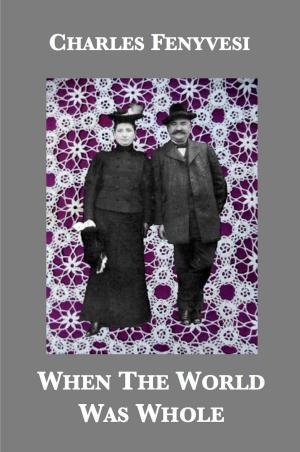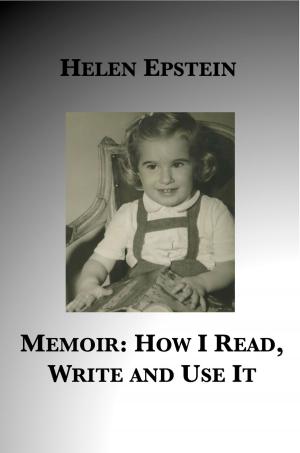The Long Half-Lives of Love and Trauma
Nonfiction, Health & Well Being, Self Help, Mental Health, Abuse, Psychology, Psychotherapy, Biography & Memoir| Author: | Helen Epstein | ISBN: | 1230002066530 |
| Publisher: | Plunkett Lake Press | Publication: | December 28, 2017 |
| Imprint: | Language: | English |
| Author: | Helen Epstein |
| ISBN: | 1230002066530 |
| Publisher: | Plunkett Lake Press |
| Publication: | December 28, 2017 |
| Imprint: | |
| Language: | English |
This intrepid memoir tracks sexual harassment and sexual abuse in the life of a veteran American journalist. It also describes the long and ultimately successful psychotherapy the author undertook to heal. The Long Half-Lives of Love and Trauma “invents its own genre,” wrote Sherry Turkle. “The author suspects sexual abuse in her childhood and investigates with the toolkits of an historian and ethnographer.” The result is a memoir that is what Eva Hoffman calls, “a true labor of memory, in which the story of the body is inseparable from the narrative of the self.”
This memoir is the third of a non-fiction trilogy, following Helen Epstein’s Children of the Holocaust: Conversations with Sons and Daughters of Survivors (Putnam, 1979) and Where She Came From: A Daughter’s Search for Her Mother’s History (Little, Brown, 1997), both widely translated. As Gloria Steinem wrote, “In Epstein’s hands, truth becomes not only stranger than fiction but more magnetic.”
“Clear-eyed, fearless, taboo-breaking... This trilogy is unusual not only because nearly 40 years separate the first and last volumes — with the second positioned midway at the 20-year mark — but also because the works differ so greatly in style, structure, and content... The Long Half-Lives of Love and Trauma’s major contribution is its willingness to talk openly and place forefront a personal trauma of sexual abuse in its post-Holocaust context... Helen Epstein has consistently rejected sanitizing Jewish history — including women’s history... She has refused to keep secrets that she knew needed to be told and she has avoided idealization, nostalgia, and hagiography.” — Irena Klepfisz, Tablet Magazine
“Epstein takes the reader through her decades-long process of self-discovery, understanding and healing accomplished through a strong bond of friendship, a solid and supportive family, and the powerfully restorative effects of psychoanalysis... written with page-turning clarity, openness and complete honesty... This is a ground-breaking memoir in style and in its contribution to the issues of sexual abuse.” — Berkshire Eagle
“This book invents its own genre. Eminent journalist Helen Epstein suspects sexual abuse in her childhood and investigates with the full arsenal of what is available to her as an adult: the literature on trauma and false memory; the tools of psychoanalysis as well as a sophisticated understanding of its limitations; the toolkits of an historian and ethnographer. And access to a key witness... That rare story in which everyone becomes more human and multi-dimensional as it unfolds.” — Sherry Turkle, author of Reclaiming Conversation: The Power of Talk in a Digital Age
“In this poignant, vividly written and fearlessly frank memoir, Helen Epstein probes, with sensitivity and insight, the multi-layered ambiguities of love, intimate relationships, and post-Holocaust American lives. More than a chronicle of events, this is a true labor of memory, in which the story of the body is inseparable from the narrative of the self.” — Eva Hoffman, author of Lost in Translation
“In midlife, well settled in marriage and motherhood, Epstein is impelled to revisit the legacy of her childhood. As she risks both her own sanity and the relationships she holds most dear, Epstein illustrates the complex moral and psychological effects of trauma, and the gritty process of recovery.” — Judith Herman, M.D., author of Trauma and Recovery
“Helen Epstein’s career has been devoted to tracking how political and cultural history penetrates family life over generations. Her books have been models of investigation. This new memoir plants an even deeper stake into the search through personal trauma... This is heroic writing, and belongs in the canon of accounts of mothers and daughters, of wounds lost in the depth of childhood, and the valiant determination of a woman to live in uncertainty with grace.” — Patricia Hampl, author of I Could Tell You Stories
“In this riveting book, Helen Epstein probes the dark corners of her childhood with sensitivity and remarkable candor. This memoir reads like a detective story and asks questions that affect us all: how does our sexual nature get formed or deformed, and how can it change? Unflinching writing.” — Anne Karpf, author of The War After: Living with the Holocaust
“Courageously peeling back layers of her own psyche, Helen Epstein describes how one is able to withstand and survive trauma, and perhaps even more difficult to heal from it. While tracing her own trajectory, Epstein offers a riveting cultural history of America in the late twentieth century.” — Helen Fremont, author of After Long Silence
“Helen Epstein has crafted an unclassifiable masterwork of nonfiction from the materials of personal memory, family history, romance, and trauma. Never in her distinguished career has Epstein written more openly or more beautifully.” — David Hajdu, author of Positively 4th Street: The Lives and Times of Joan Baez, Bob Dylan, Mimi Baez Fariña, and Richard Fariña
“Candid and penetrating... Epstein meticulously unravels the fabric of her past... A relentlessly probing memoir of a search for self-knowledge.” — Kirkus
This intrepid memoir tracks sexual harassment and sexual abuse in the life of a veteran American journalist. It also describes the long and ultimately successful psychotherapy the author undertook to heal. The Long Half-Lives of Love and Trauma “invents its own genre,” wrote Sherry Turkle. “The author suspects sexual abuse in her childhood and investigates with the toolkits of an historian and ethnographer.” The result is a memoir that is what Eva Hoffman calls, “a true labor of memory, in which the story of the body is inseparable from the narrative of the self.”
This memoir is the third of a non-fiction trilogy, following Helen Epstein’s Children of the Holocaust: Conversations with Sons and Daughters of Survivors (Putnam, 1979) and Where She Came From: A Daughter’s Search for Her Mother’s History (Little, Brown, 1997), both widely translated. As Gloria Steinem wrote, “In Epstein’s hands, truth becomes not only stranger than fiction but more magnetic.”
“Clear-eyed, fearless, taboo-breaking... This trilogy is unusual not only because nearly 40 years separate the first and last volumes — with the second positioned midway at the 20-year mark — but also because the works differ so greatly in style, structure, and content... The Long Half-Lives of Love and Trauma’s major contribution is its willingness to talk openly and place forefront a personal trauma of sexual abuse in its post-Holocaust context... Helen Epstein has consistently rejected sanitizing Jewish history — including women’s history... She has refused to keep secrets that she knew needed to be told and she has avoided idealization, nostalgia, and hagiography.” — Irena Klepfisz, Tablet Magazine
“Epstein takes the reader through her decades-long process of self-discovery, understanding and healing accomplished through a strong bond of friendship, a solid and supportive family, and the powerfully restorative effects of psychoanalysis... written with page-turning clarity, openness and complete honesty... This is a ground-breaking memoir in style and in its contribution to the issues of sexual abuse.” — Berkshire Eagle
“This book invents its own genre. Eminent journalist Helen Epstein suspects sexual abuse in her childhood and investigates with the full arsenal of what is available to her as an adult: the literature on trauma and false memory; the tools of psychoanalysis as well as a sophisticated understanding of its limitations; the toolkits of an historian and ethnographer. And access to a key witness... That rare story in which everyone becomes more human and multi-dimensional as it unfolds.” — Sherry Turkle, author of Reclaiming Conversation: The Power of Talk in a Digital Age
“In this poignant, vividly written and fearlessly frank memoir, Helen Epstein probes, with sensitivity and insight, the multi-layered ambiguities of love, intimate relationships, and post-Holocaust American lives. More than a chronicle of events, this is a true labor of memory, in which the story of the body is inseparable from the narrative of the self.” — Eva Hoffman, author of Lost in Translation
“In midlife, well settled in marriage and motherhood, Epstein is impelled to revisit the legacy of her childhood. As she risks both her own sanity and the relationships she holds most dear, Epstein illustrates the complex moral and psychological effects of trauma, and the gritty process of recovery.” — Judith Herman, M.D., author of Trauma and Recovery
“Helen Epstein’s career has been devoted to tracking how political and cultural history penetrates family life over generations. Her books have been models of investigation. This new memoir plants an even deeper stake into the search through personal trauma... This is heroic writing, and belongs in the canon of accounts of mothers and daughters, of wounds lost in the depth of childhood, and the valiant determination of a woman to live in uncertainty with grace.” — Patricia Hampl, author of I Could Tell You Stories
“In this riveting book, Helen Epstein probes the dark corners of her childhood with sensitivity and remarkable candor. This memoir reads like a detective story and asks questions that affect us all: how does our sexual nature get formed or deformed, and how can it change? Unflinching writing.” — Anne Karpf, author of The War After: Living with the Holocaust
“Courageously peeling back layers of her own psyche, Helen Epstein describes how one is able to withstand and survive trauma, and perhaps even more difficult to heal from it. While tracing her own trajectory, Epstein offers a riveting cultural history of America in the late twentieth century.” — Helen Fremont, author of After Long Silence
“Helen Epstein has crafted an unclassifiable masterwork of nonfiction from the materials of personal memory, family history, romance, and trauma. Never in her distinguished career has Epstein written more openly or more beautifully.” — David Hajdu, author of Positively 4th Street: The Lives and Times of Joan Baez, Bob Dylan, Mimi Baez Fariña, and Richard Fariña
“Candid and penetrating... Epstein meticulously unravels the fabric of her past... A relentlessly probing memoir of a search for self-knowledge.” — Kirkus















